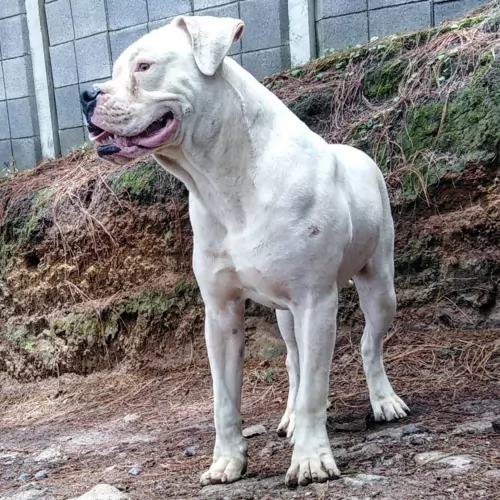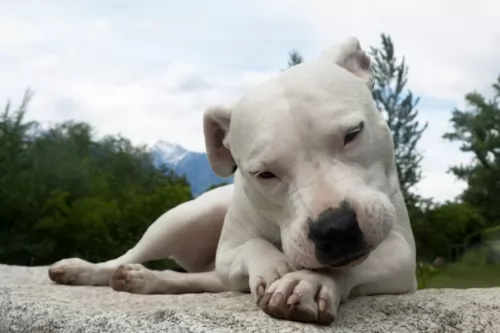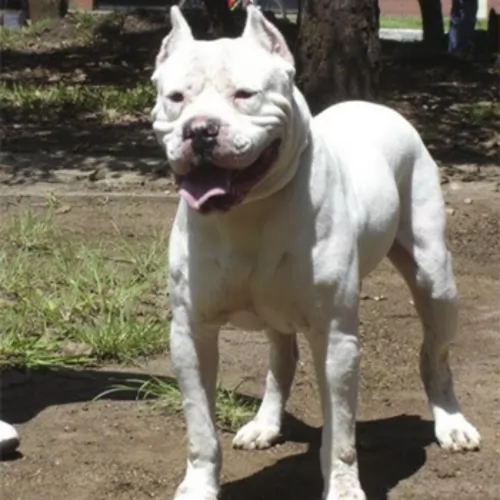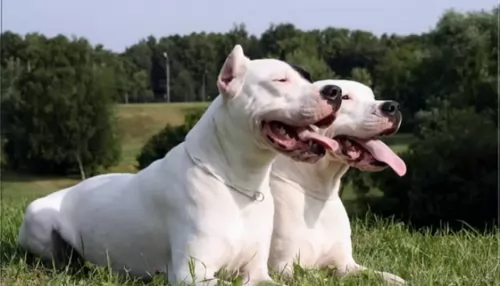 Petzlover
PetzloverDogo Guatemalteco is originated from Guatemala but Hawaiian Poi Dog is originated from Indonesia. Dogo Guatemalteco may grow 22 cm / 9 inches higher than Hawaiian Poi Dog. Dogo Guatemalteco may weigh 30 kg / 67 pounds more than Hawaiian Poi Dog. Dogo Guatemalteco may live 4 years more than Hawaiian Poi Dog. Dogo Guatemalteco may have more litter size than Hawaiian Poi Dog. Dogo Guatemalteco requires Moderate Maintenance. But Hawaiian Poi Dog requires Low Maintenance
 Known as the Guatemalteco Bull Terrier or Guatemalan Molosser, the Dogo Guatemalteco is also known as the Bull Terrier Guatemalteco, Guatemalan Bull Terrier, and Guatemalan Molosser.
Known as the Guatemalteco Bull Terrier or Guatemalan Molosser, the Dogo Guatemalteco is also known as the Bull Terrier Guatemalteco, Guatemalan Bull Terrier, and Guatemalan Molosser.
This big Molosser-type dog originates in Guatemala. In the 20th century, it was known as the Bullterrier Guatemalteco, but at the end of the century, it was changed to Dogo Guatemalteco.
Today, while the dog is kept as a companion dog, most are working guard dogs. The Dogo Guatemalteco isn’t recognized by any major international kennel clubs. However, the Kennel Club of Guatemala has given full recognition to this dog and it was in 1981 that the Guatemalan government named the dog as their national dog breed.
The Hawaiian Poi Dog was a descendent of the dogs brought to the Islands by the Polynesian. These Polynesian dogs were themselves descendants of the kuri dog of New Zealand. These kuri dogs were originally from Indonesia. The Hawaiian Poi dog is now extinct but at one time was considered the spiritual protector of Hawaiian children and also used as food by hungry Native Hawaiians.
The dog was called poi which was the word for a food staple mad from the root of Taro and used to put weight on the dogs before they were eaten. Meat was not fed to the dogs because it was too scarce. There was no large mammals to hunt and so the breed was never given a standard. The Poi dog seen by European explorers were short legged, pot bellied canines that lived with the hogs in the towns. Because of what they ate, the dogs were not highly intelligent but were stubborn and hard to train. Because the dogs were not suited for much beyond food and a spiritual charm, they became extinct when the traditional religion was no longer practiced and eating dogs was no longer acceptable. The breed pretty much disappeared by the early 20th century. Very few images of the dogs remain except for ancient petroglyphs.
There was an attempt by the Honolulu Zoo in the late 1960’s to redevelop the breed using local dogs to determine a standard. Then the local dogs were bred as close to the standard as possible. In the third generation one dog was born with the traits of a Poi dog. There was not much more success with this and then the Polynesian ship travel between Tahiti and Hawaii was recreated and a dog taken along.
Today’s mixed breed dogs in Hawaii are called Poi dogs but also have the stubbornness, unique appearance and ability to eat anything it is given like the original Poi. The dogs are small, and should not be confused with the original Poi dogs.
 The Guatemalteco is a medium to large dog standing at 54 – 60cm and weighing between 40-45kg. He has a short, smooth coat and is essentially white with some black markings on the head.
The Guatemalteco is a medium to large dog standing at 54 – 60cm and weighing between 40-45kg. He has a short, smooth coat and is essentially white with some black markings on the head.
This breed was created from a crossing between a bull terrier, boxer and dalmatian. Some of the dogs are thickly built, while others are more leaner and athletic looking.
The ears of the dog vary quite a bit because while sometimes the ears fold down closely to the head, others are semi-pricked. There are some dog owners who have their dogs ears cropped into fully erect triangular shapes. The eye are small and usually dark brown.
The Dogo Guatemalteco is a fearless, evenly tempered dog. He was bred as a guard dog and he wants to protect his human family, forming a deep bond with them. It makes them difficult to re-home because of this.
It is imperative to have this dog trained and socialized because it might believe its the leader of the pack in your home. He is quite capable of getting along well with children and pets in the home. Because of his dominant nature, he isn’t suited as a pet for the first-time dog owner. He also doesn’t warm easily to strangers.
As previously mentioned the Poi dog is somewhat unusual in size and shape due to what they ate. They looked somewhat like the native dogs of Polynesia and New Zealand. They have short legs, long bodies, somewhat obese and a very flat head. He had a short smooth coat, in any color or any pattern. They were however mostly brown and they might or might not have white markings.
 Your Dogo Guatemalteco is an intelligent dog breed, and because he is strong-willed and stubborn he might give you a hard time during training. It is possible though and it is important as the training will turn him into an obedient, relaxed dog, able to get on with all his family members, including pets.
Your Dogo Guatemalteco is an intelligent dog breed, and because he is strong-willed and stubborn he might give you a hard time during training. It is possible though and it is important as the training will turn him into an obedient, relaxed dog, able to get on with all his family members, including pets.
He is an energetic dog and will require walks and other forms of exercise each day.
This is certainly not the kind of dog that you buy to protect your property and provide little else for him except food and water. Frustration on the dog’s part can lead to destructive behavior and aggression.
The Hawaiian Poi dog was very friendly and good with children
The Poi was considered a good luck charm and a spiritual protector of children
Given what they faced in life, the Poi dog was very adaptable, living anywhere on the islands and eating anything it could find.
Due to their poor diet, the Hawaiian Poi dog was seriously lacking in intelligence and learning ability.
 This dog can be susceptible to skin allergies. The skin is sensitive and prone to rashes.
This dog can be susceptible to skin allergies. The skin is sensitive and prone to rashes.
Another health concern with this dog because of his white coat, is congenital deafness. The deafness could be in one- or both ears.
The dog could also experience lameness, of which the most common problem is hip dysplasia. Because skeletal problems occur in this breed, it is advisable for owners to have their pet tested by the Orthopedic Foundation for Animals.
Probably due to its diet, the Poi dog had several problems to their health. Their poor diet led to a sluggishness both in movement and intelligence. Its development was hampered by a lack of protein. Malnutrition and serious over inbreeding caused a weakness and poor oral hygiene. Due to this lack of teeth and chewing the bones in the dogs heads became flat. The Poi had breathing issues and overall lethargy.
 The coat of the dog is short and harsh and it sheds throughout the year. While he is still looked upon as a low maintenance dog, regular brushing will be required twice a week.
The coat of the dog is short and harsh and it sheds throughout the year. While he is still looked upon as a low maintenance dog, regular brushing will be required twice a week.
Because he is a dog breed that is susceptible to skin allergies, bathing isn't necessary as it removes the dog’s natural oils.
Other areas of grooming for this dog are brushing his teeth twice a week, trimming his nails and checking his ears.
Always choose a high quality dog food for your Dogo Guatemalteco and look at the feeding recommendations on the packaging.
When you feed your pet kibble, you can also mix in some cooked brown rice, vegetable and chicken for variety and contentment.
Raw meat is also advised from time to time. Don’t just go on and on through the years feeding your dog the same amount of food, as there are factors to take into account when deciding on food quantity. The age of your dog, it’s stage of life and its activity levels will mean regulating your pet’s food to match his needs.
With meat being rare in Hawaii, none was available for the dogs. They were fed Poi – from the Taro plant roots. Puppies were fed 2-3 times a day.
The adult dog was fed once or twice a day the same as Poi puppies were fed.
The Hawaiian Poi dog basically has not good health points.
The Poi dog did not need and did not get much exercise, leading to its demise.